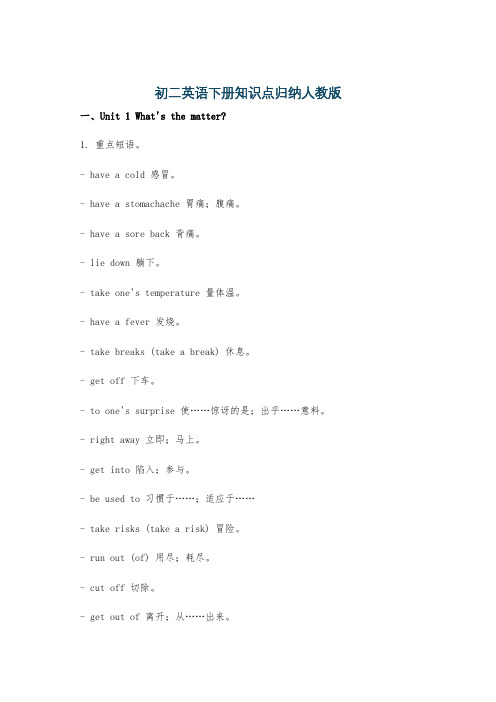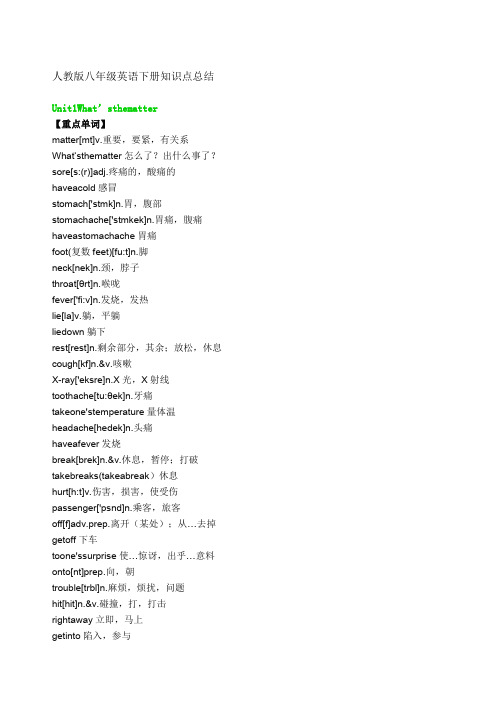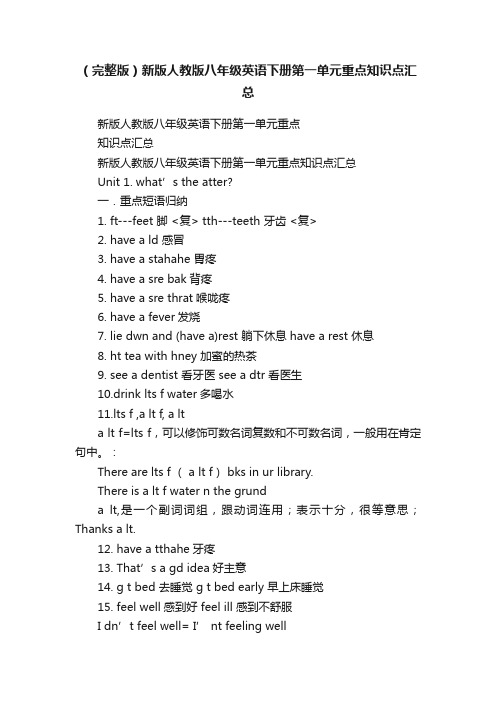八年级下英语第一单元知识点总结【人教版】
初二英语下册知识点归纳人教版

初二英语下册知识点归纳人教版一、Unit 1 What's the matter?1. 重点短语。
- have a cold 感冒。
- have a stomachache 胃痛;腹痛。
- have a sore back 背痛。
- lie down 躺下。
- take one's temperature 量体温。
- have a fever 发烧。
- take breaks (take a break) 休息。
- get off 下车。
- to one's surprise 使……惊讶的是;出乎……意料。
- right away 立即;马上。
- get into 陷入;参与。
- be used to 习惯于……;适应于……- take risks (take a risk) 冒险。
- run out (of) 用尽;耗尽。
- cut off 切除。
- get out of 离开;从……出来。
- be in control of 掌管;管理。
2. 重点句型。
- What's the matter? = What's wrong? = What's the trouble? 怎么了?- Should I put some medicine on it? 我应该在它(伤口)上敷些药吗?- You should lie down and rest. 你应该躺下休息。
- He hurt himself in P.E. class. 他在体育课上伤到了自己。
- Aron Ralston is an American man who is interested in mountain climbing. 阿伦·罗尔斯顿是一个对登山感兴趣的美国人。
3. 语法。
- 情态动词should的用法:should表示“应该”,用来提出建议或劝告,后接动词原形。
例如:You should see a dentist. 否定形式为shouldn't,例如:You shouldn't go to school late.二、Unit 2 I'll help to clean up the city parks.1. 重点短语。
最全面人教版八年级下册英语第一单元知识点归纳总结

Unit 1 What's the matter?一、词汇与短语◆重点单词A部分1.matter n. 问题;事情2.sore adj. 疼痛的;酸痛的3.stomachache n. 胃痛;腹痛4.foot n. 脚;足5.neck n. 颈;脖子6.stomach n. 胃;腹部7.throat n. 咽喉;喉咙8.hurt v. (使)疼痛;受伤9.fever n. 发烧10.passenger n. 乘客;旅客11.lie v. 躺;平躺12.break n. 间歇;休息13.rest v. &n. 放松;休息14.onto prep. 向;朝15.X-ray n. X射线;X光16.trouble n. 问题;苦恼17.toothache n. 牙痛18.hit n. (用手或器具)击;打19.headache n. 头痛20.herself pron. (she的反身代词)她自己21.off adv. & prep. 离开(某处);不工作;从……去掉B部分1.bandage n. 绷带v. 用绷带包扎2.press v. 压;挤;按3.sick adj. 生病的;有病的4.knee n. 膝;膝盖5.breathe v. 呼吸6.knife n. 刀7.sunburned adj. 晒伤的8.blood n. 血9.ourselves pron. (we反身代词)我们自己10.mean v. 意思是;打算11.climber n. 登山者;攀登者12.importance n. 重要性;重要13.risk n.&v. 危险;风险;冒险14.decision n. 决定;抉择15.accident n.(交通)事故;意外遭遇16.control v.&n. 限制;约束;管理17.situation n. 情况;状况18.spirit n. 勇气;意志19.kilo( = kilogram) n. 千克;公斤20.death n. 死;死亡21.rock n. 岩石22.nurse n. 护士◆重点短语A部分1.have a cold 感冒2.lie down 躺下3.have a stomachache 胃痛4.take one's temperature 量体温5.have a fever 发烧6.to one's surprise 使……惊讶的是7.get off 下车8.right away 立即;马上9.take breaks (take a break) 休息10.talk too much 说得太多11.drink enough water 喝足够的水12.have a very sore throat 嗓子非常疼13.get an X-ray 拍X光片14.see a dentist 看牙医15.drink some hot tea with honey 喝一些加蜂蜜的热茶16.put some medicine on sth.在……上面敷一些药17.feel very hot 感到很热18.sound like 听起来像19.all weekend 整个周末20.in the same way 以同样的方式21.go to a doctor 看医生22.go along 沿着……走23.on the side of the road 在马路边24.shout for help 大声呼救25.without thinking twice 没有多想26.have a heart problem 有心脏病27.thanks to 多亏了;由于28.in time 及时29.save a life 挽救生命30.get into trouble 陷入麻烦31.hurt oneself 受伤32.fall down落下;摔倒B部分1.be used to 习惯于……;适应于……2.in a difficult situation 在困境中3.take risks (take a risk) 冒险4.keep on doing sth. 继续(或坚持)做某事5.run out (of) 用尽;耗尽6.make a decision 作出决定7.cut off 切除8.get hit on the head 撞到头部9.get out of 离开;从……岀来10.be interested in 对……感兴趣11.give up 放弃12.mean doing sth. 意味着做某事13.put a bandage on sth. 用绷带包扎…14.lose one's life 失去生命15.feel sick 感到恶心16.mountain climbing 登山运动17.have problems breathing 呼吸困难18.be in control of 掌管;管理◆重点句子A部分1.What's the matter with you?=What's the trouble with you?=What's wrong with you?你怎么了?2.What should she do? 她该怎么办呢?3.Did you fall down? 你跌倒了吗?4.Should I take my temperature? 我应该量一下体温吗?5.I think I sat in the same way for too long without moving.我想我以同样的姿势一动不动地坐得太久了。
最新人教版八年级英语下册第一单元知识点汇总

最新人教版八年级英语下册第一单元知识点汇总Unit 1 What’s the matter?一、基础知识1.我感冒了。
可以表达为I had a cold、catch a cold或have the flu。
have a fever表示发烧,have a cough表示咳嗽,have a stomachache或肚子疼表示胃疼,have a toothache表示牙疼,have a headache表示头疼。
2.将身体部位和ache(疼痛)结合起来构成新的复合词,如stomach+ache=stomachache,head+ache=headache,tooth+ache=toothache,back+ache=backache,表示相应的疼痛。
3.“怎么啦?出什么事情了?”可以表达为What’ s the matter。
也可以用What’ s the trouble with you?或What’ s wrong with you。
matter和trouble为名词,其前可加the或形容词性物主代词,而wrong是形容词不能加the。
用于询问某人有什么病或遇到什么麻烦、问题,其后跟询问对象时,与介词with连用,如What’s the matter with sb。
= What’s your trouble?= What’s up?= What happens to sb。
举例来说,当问到“What’s the matter with you?”时,回答可以是“I have a bad cold.”4.maybe表示“或许”,常用于句首,表示可能性,后加句子。
例如Maybe you are right。
may be是情态动词+be的结构,意为“可能,也许”,后加名词、代词或形容词。
例如He maybe angry。
sound like可以和名词、代词以及从句结合使用,如It sounds like you don’t know the truth.It sounds like a good idea。
人教版八年级英语下册知识点总结

人教版八年级英语下册知识点总结Unit1What’sthematter【重点单词】matter[mt]v.重要,要紧,有关系What’sthematter怎么了?出什么事了?sore[s:(r)]adj.疼痛的,酸痛的haveacold感冒stomach['stmk]n.胃,腹部stomachache['stmkek]n.胃痛,腹痛haveastomachache胃痛foot(复数feet)[fu:t]n.脚neck[nek]n.颈,脖子throat[θrt]n.喉咙fever['fi:v]n.发烧,发热lie[la]v.躺,平躺liedown躺下rest[rest]n.剩余部分,其余;放松,休息cough[kf]n.&v.咳嗽X-ray['eksre]n.X光,X射线toothache[tu:θek]n.牙痛takeone'stemperature量体温headache[hedek]n.头痛haveafever发烧break[brek]n.&v.休息,暂停;打破takebreaks(takeabreak)休息hurt[h:t]v.伤害,损害,使受伤passenger['psnd]n.乘客,旅客off[f]adv.prep.离开(某处);从…去掉getoff下车toone'ssurprise使…惊讶,出乎…意料onto[nt]prep.向,朝trouble[trbl]n.麻烦,烦扰,问题hit[hit]n.&v.碰撞,打,打击rightaway立即,马上getinto陷入,参与herself[h:self]pron.她自己,她本身(she的反身代词)bandage['bndd]n.&v.绷带;用绷带包扎sick[sk]adj.患病的,不适的knee[ni:]n.膝盖nosebleed[nzbli:d]n.鼻出血breathe[bri:e]v.呼吸sunburned[snb:nd]adj.晒伤的ourselves[ɑ:selvz]pron.我们自己(we的反身代词)climber[klam(r)]n.登山者beusedto习惯于…适应于…risk[rsk]n.&v.风险,危险;冒险takerisks(takearisk)冒险accident[ksidnt]n.意外事件;事故situation[sitjuein]n.状况,形式,情况kg=kilogram[klgrm]n.公斤,千克rock[rk]n.岩石runout(of)用尽,耗尽knife[naif]n.刀,餐刀cutoff切除blood[bld]n.血mean[mi:n]v.意味着,意思是,意欲getoutof离开,从…出来importance[mp:tns]n.重要性decision[d'sn]n.决心,决定,抉择control[kn'trl]v.控制,支配,操纵beincontrolof掌管,管理spirit['sprt]n.勇气,意志death[deθ]n.死亡giveup放弃nurse[n:s]n.护士【重点短语】1.haveafever发烧2.haveacough咳嗽3.haveatoothache牙疼4.talktoomuch说得太多5.drinkenoughwater喝足够的水6.haveacold受凉;感冒7.haveastomachache胃疼8.haveasoreback背疼9.haveasorethroat喉咙痛10.takerisks冒险11.hotteawithhoney加蜂蜜的热茶12.seeadentist看牙医13.getanX-ray拍X光片14.takeone’stemperature量体温15.putsomemedicineonsth.在……上面敷药16.giveup放弃17.soundlike听起来像18.allweekend整个周末19.inthesameway以同样的方式20.gotoadoctor看医生21.goalong沿着……走22.onthesideoftheroad在马路边23.shoutforhelp大声呼救24.withoutthinkingtwice没有多想25.getoff下车26.haveaheartproblem有心脏病27.toone’ssurprise另某人惊讶的是28.thanksto多亏了;由于29.intime及时30.makeadecision做出决定31.getintotrouble造成麻烦32.rightaway立刻;马上33.becauseof由于34.getoutof离开;从……出来35.keepondoingsth.继续或坚持做某事36.putabandageonsth.用绷带包扎37.falldown摔倒38.feelsick感到恶心39.haveanosebleed流鼻血40.cuthisknee割伤他的膝盖41.putherheadback把她的头向后仰42.haveproblemsbreathing呼吸困难43.mountainclimbing登山运动44.beusedtodoingsth.习惯做某事45.runout(of)用完;用尽46.sothat以便47.so...that...如此……以至于...…48.beincontrolof掌管;管理49.inadifficultsituation在闲境中【重点句型】1.What'sthematterwithyou=What'thetroublewithyou=What'swrongwithyou你怎么了?2.Whatshouldshedo她该怎么办呢?3.ShouldItakemytemperature我应该量一下体温吗?4.Youshouldliedownandrest.你应该躺下休息一会儿。
(完整版)新版人教版八年级英语下册第一单元重点知识点汇总

(完整版)新版人教版八年级英语下册第一单元重点知识点汇总新版人教版八年级英语下册第一单元重点知识点汇总新版人教版八年级英语下册第一单元重点知识点汇总Unit 1. what’s the atter?一.重点短语归纳1. ft---feet 脚 <复> tth---teeth 牙齿 <复>2. have a ld 感冒3. have a stahahe 胃疼4. have a sre bak背疼5. have a sre thrat喉咙疼6. have a fever发烧7. lie dwn and (have a)rest 躺下休息 have a rest 休息8. ht tea with hney 加蜜的热茶9. see a dentist 看牙医 see a dtr 看医生10.drink lts f water多喝水11.lts f ,a lt f, a lta lt f=lts f,可以修饰可数名词复数和不可数名词,一般用在肯定句中。
:There are lts f ( a lt f) bks in ur library.There is a lt f water n the grunda lt,是一个副词词组,跟动词连用;表示十分,很等意思;Thanks a lt.12. have a tthahe牙疼13. That’s a gd idea好主意14. g t bed 去睡觉 g t bed early 早上床睡觉15. feel well感到好 feel ill 感到不舒服I dn’t feel well=I’ nt feeling well我感觉不舒服.16. start ding/ t d sth开始做某事T D 是一件事情完成了,开始做另外一件事情DING是原的那件事情做到一半,现在又开始做了,是同一件事情。
17. tw days ag两天前18. get se rest 多休息, 休息一会儿19. I think s我认为是这样20. be thirsty口渴21. be hungry 饥饿22. be stressed ut紧张23. listen t usi听音乐24. healthy lifestyle健康的生活方式25. traditinal hinese dtrs传统中医26. need t d sth 需要做某事I have a tthahe. I need t see a dentist. 我牙痛, 我需要去看牙医.e need t keep ur lassr lean. 我们需要保持教室的干净.27. a balane f yin and yang阴阳平衡28. fr exaple例如29. t uh yin太多的阴, 阴气太盛t uh + 不可数名词太多的…uh t +形/副实在太…极其,非常t any + 可数名词复数太多的…30.be gd fr sth./ ding sth. 对什么有益,对什么有好处be bad fr sth./ ding sth. 对什么有害be gd t 对…好be gd at =d well in 在……方面好,擅长be gd(bad) fr、be gd at的相关用法1.be gd fr 对......有益Ding rning exerises is gd fr yur health.做早操对你们的建康有益。
人教版八年级英语下册第一单元知识点汇总

人教版八年级英语下册第一单元知识点汇总Unit 1: Where did you go on vacation?第一单元:你去过哪里度假?I. Vocabulary(词汇)1. vacation (n.) - a period of time when you are not working or studying, especially one spent traveling or doing enjoyable things.(假期)2. destination (n.) - a place to which someone is going or where something is being sent or taken.(目的地)3. explore (v.) - to travel to a new place in order to learn about it or to search and discover new things.(探索)4. souvenir (n.) - something that you buy or keep to remind you of a special place or trip(纪念品)5. sightseeing (n.) - the activity of visiting interesting places, especially as tourists(观光)6. fascinating (adj.) - extremely interesting or attractive(迷人的)7. relaxing (adj.) - helping you to rest and become less anxious or tense (放松的)II. Grammar(语法)1. Simple Past Tense(一般过去时)- Used to talk about completed actions or events in the past.- Regular verbs: add -ed to the base form of the verb. Example: walked, talked.- Irregular verbs: do not follow the regular pattern. Example: went, ate.2. Adverbs of Frequency(频度副词)- Used to show how often something happens.- Examples: always, sometimes, often, rarely, never.III. Sentence Structure(句子结构)1. Questions with "Where"(带有"Where"的疑问句)- Used to ask about the location or place.- Example: Where did you go on vacation?2. Answers with "I went to..."(回答时使用"I went to...")- Used to respond to a question about where someone went on vacation.- Example: I went to the beach.IV. Communication(交际)1. Asking for and giving information(询问和提供信息)- Used to ask about and provide details of a vacation.- Example: A: Where did you go on vacation? B: I went to Paris.2. Expressing preferences(表达偏好)- Saying what you like or dislike about a vacation.- Example: I liked the food in Italy, but I didn't enjoy the crowded streets.V. Culture Corner(文化角落)1. Different types of vacations(不同类型的度假方式)- Beach vacation: spending time at the beach and enjoying the sun and sea.- Safari vacation: going on a wildlife adventure in natural reserves.- City vacation: exploring cities and visiting famous landmarks.- Mountain vacation: enjoying outdoor activities in mountainous regions.- Cultural vacation: immersing yourself in the local culture and traditions.总结:本单元主要学习了与度假相关的词汇以及过去式的用法。
人教版八年级英语下册各单元知识点总结完整版

Unit 1 What’s the matter?一、重点短语1. have a fever 发烧2. have a cough 咳嗽3. have a toothache 牙疼4. talk too much 说得太多5. drink enough water 喝足够的水6. have a cold 受凉;感冒7. have a stomachache 胃疼8. have a sore back 背疼9. have a sore throat 喉咙痛10. lie down and rest躺下来休息11. hot tea with honey加蜂蜜的热茶12. see a dentist看牙医13. get an X-ray拍X光片14. take one’ s temperature量体温15. put some medicine on sth在……上面敷药16. feel very hot 感到很热17. sound like 听起来像18. all weekend 整个周末19. in the same way以同样的方式20. go to a doctor 看医生21. go along 沿着……走22. on the side of the road 在马路边23. shout for help 大声呼救24. without thinking twice 没有多想25. get off 下车26. have a heart problem 有心脏病27. to one’ s surprise 使……惊讶的28. thanks to 多亏了;由于29. in time及时30. save a life 挽救生命31. get into trouble 造成麻烦32. right away 立刻;马上33. because of 由于34. get out of 离开35. hurt oneself 受伤36. put a bandage on sth. 用绷带包扎37. fall down 摔倒38. feel sick 感到恶心39. have a nosebleed 流鼻血40. cut his knee割伤他的膝盖41. put her head back 把她的头向后仰42.have problems breathing呼吸困难43. mountain climbing登山运动44. be used to doing sth. 习惯做某事45. run out (of) 用完;用尽46. so that 以便47. so…that 如此……以至于……48. be in control of 掌管;管理49. in a difficult situation 在逆境屮50. keep on doing sth.坚持做某事51. make a decision做出决定52. take risks 冒险53. give up 放弃二、知识点解析1. What’s the matter? 怎么了?若是询问“某人怎么了?”要用“What’s the matter with sb.?”拓展:What’s the matter with sb.? 的同义句:What’s wrong with sb.? / What’s the trouble with sb.?2.疾病类短语:have a +疾病. e.g. :have a fever 发烧have a cold 感冒have a cough 咳嗽.have a +身体部位-ache. e.g.: have a headache 头痛have a toothache 牙痛.have a sore+身体部位. e.g.: have a sore throat咽喉痛have a sore back背痛例题:Mom, I____________.I’m sorry to hear that, dear. We must go to see the dentist right away.A. have a headacheB. have a stomachacheC. have a toothacheD. have a fever3. lie down 躺下V. 躺,平躺。
人教版八年级下第一单元知识点总结

Unit 1 What’s the matter? 知识点总结一、基本知识点1. What’s the matter (with you)? 怎么了?出什么事了?What’s the trouble/ the problem / wrong with sb./ sth.?2. I had a cold.我感冒了。
have a cold=catch a cold=have the flu have a fever have a cough咳嗽have a stomachache胃疼,肚子疼have a toothache牙疼have a headache头疼3. 身体部位+ache(疼痛)构成新的复合词stomach+ache=stomachache head+ache=headache tooth+ache=toothacheback+ache=backache后背痛4. much too+ 词,意为,too much+ 词,意为。
5. enough【形容、副词】足够的/地,enough放在名前后,形副后。
good enough足够好,enough money=money money6. lie down躺下,lie 躺,躺着,过去式lay;lie说谎,过去式lied7. maybe “或许”,常用于句首,表示可能性,后加句子。
Maybe you are right.may be,是情态动词+be的结构,意为“可能,也许”,后加名词、代词或形容词。
He may be angry.8.sound like+名词代词和从句:It sounds like you don’t know the truth.It sounds like a good idea.sound+形容词,“听起来,好像”,The music sounds nice.9. need 需要,实义动词need+名词,需要某物;need to do sth.需要做某事,主语通常是人,表示人主动的动作:You need to listen carefully during class.need doing sth.主语通常是物,表示被动的动作:Your dirty clothes need washing.10. get off (the bus) 下(公交车)get on 上车11. agree 同意,赞同;同意做某事,同意某人的看法、观点12. trouble问题,麻烦;be in trouble ,maketrouble ,have trouble (in) doing sth. =have difficulties (in) doingsth 。
- 1、下载文档前请自行甄别文档内容的完整性,平台不提供额外的编辑、内容补充、找答案等附加服务。
- 2、"仅部分预览"的文档,不可在线预览部分如存在完整性等问题,可反馈申请退款(可完整预览的文档不适用该条件!)。
- 3、如文档侵犯您的权益,请联系客服反馈,我们会尽快为您处理(人工客服工作时间:9:00-18:30)。
Unit 1 Will people have robots?1. fall v. come or go down from force of weight, loss of balance, etc; drop; become 落下;跌落;变成fall用作动词时,主要有两种用法。
一种是作为实义动词,可以和介词或副词搭配,表示“落下;跌落”,例如:I fell back in my chair. 我跌坐到自己的椅子上。
另一种是作为系动词,与形容词连用,表示进入某种状态,如:fall asleep 入睡(进入睡眠的状态)。
fall的动词过去式是fallen。
fall用作名词时,表示“落下;降低”,例如:I sat listening to the fall of the rain on the roof. 我坐着听雨点落在屋檐上的声音。
fall还可以表示“秋天”,与autumn意思相同。
词汇扩展常用搭配:fall asleep 入睡fall behind 落后于(某人或某物)fall down 跌落fall in love with 喜爱;爱上fall off 掉下fall over 跌落;被绊倒2. alone adv. Without any companions 独自地;孤独地用法解析along 和lonely:(1)alone 既可用作形容词,又可用作副词,意思是“独自的(地);单独的(地)”,侧重于说明独自一人,没有同伴或助手。
alone和on one's own,by oneself意思相近。
alone用作形容词时,一般与be 动词连用,在句中作表语。
例如:She is alone at home. 她独自一人在家。
alone 用作副词修饰动词时,放在动词后面作状语。
例如:I like to work alone. 我喜欢独自一人工作。
alone 用作副词时,也可作定语,意思是“只有;仅仅”,但必须置于它所修饰的名词或代词之后。
例如:This year alone, we've already planted ten thousand trees. 仅是今年,我们已经载了一万颗树。
(2)lonely只用作形容词,它在句中既可作定语,也可作表语,表示“孤独的;寂寞的”。
该词带有“孤寂”的感情色彩。
用作定语时,意思为“孤单的;荒凉的;偏僻的”等。
例如:That's a lonely island. 那是一个荒凉的岛屿。
Lonely用作表语时,可以表示“孤寂的;寂寞的”。
例如:I was alone but I didn't feel lonely. 我独自一人,但我并不感到孤独。
词汇拓展常用搭配:let / leave somebody / something alone 不干涉某人或某物;听其自然let alone 不管;不必考虑3. dress v. put clothes on yourself or someone else 穿衣用法dress还可以用作名词,表示“女服;连衣裙;服装”。
例如:Mary wore a long red dress last evening. 玛丽昨晚穿了件红色的连衣长裙。
辨析dress,put on 和wear:(1)用作动词时,dress既可以表动作,也可以表状态,常用人作宾语,意思是“……穿衣服”,例如:She is only a girl of three. She can't dress herself. 她只是一个三岁的女孩,她还不能自己穿衣服。
需要注意的是,在表示“给自己穿衣”时,我们通常说dress oneself (= get dressed);当dress表示状态时,一般要用be dressed in 结构,例如:She was dressed in a red coat. 她穿着一件红色的上衣。
(2)put on 意思是“穿(戴)上”,强调动作。
例如:He put on his coat and went out. 他穿上大衣就出去了。
(3)wear意思是“穿(戴)着”,强调状态。
例如:Lucy's mother often wears a pair of glasses. 露西的母亲常常戴着一副眼镜。
词汇扩展常用搭配:dress (somebody) up (in something / as somebody or something) 化妆打扮谚语:Eat to please myself, but dress to please others. 吃是使自己受用,穿是使别人受用。
Unit 1 Will people have robots? 词汇(2)1. unpleasant adj. not pleasant; not enjoyable 使人不愉快的;不合意的用法unpleasant可以表示“令人不快的;讨厌的”,例如:I found his manner very unpleasant. 我觉得他的态度讨厌极了。
词汇拓展相关词:unpleasantly adv. 厌恶地反义词:pleasant adj. 令人愉快的记忆导航unpleasant 是由pleasant 加上否定前缀un-构成的。
类似这种构词法的词还有:able有能力的——unable没有能力的;happy高兴的——unhappy不高兴的。
2. hundred n. the number 100; a very large number of things or people (一)百;许多(事物或人)用法hundred 用于数词或含有数量意义的词之后,一般不用复数形式,例如:three hundred, a few hundred 等。
但当hundred 表示“成百的;许多的”意思时,它面前不用具体数字,而常用hundreds of 结构。
注意hundred 在这个结构中要用复数形式,前面可加some,a few,several等词修饰。
例如:Her coat cost hundreds of dollars. 她的大衣价值几百美元。
类似的搭配还有thousands of数以千计的;许多的,millions of 数以百万计的;无数的。
3. such adj. of the same kind as the thing or person which has already been mentioned 这(那)样的;这(那)种用法辨析such 和so:(1)such 是形容词,意思是“这(那)样的;这(那)种;如此的”,修饰名词。
例如:I have never seen such a beautiful place before. 我从未见过这么美的地方。
需要特别注意的是,such修饰单数可数名词时,应该按照如下词序:such + a / an + 形容词+ 单数可数名词。
(2)so是副词,意思是“这(那)么;这(那)样;如此地”,修饰形容词、副词和分词。
例如:I have never seen so beautiful a place before. 我从未见过这么美的地方。
同样,需要特别注意的是,so 修饰单数可数名词时,应该按照如下词序:so + 形容词+ a / an + 单数可数名词。
此外,当名词前有few,many,little,much等修饰词时,要用so。
例如:so many people,so few days,so much time,so little money等。
词汇拓展常用搭配:such as 例如such and such 某某;这样那样的Unit 1 Will people have robots? 词汇(3)1. in prep. 在……之后(用于将来时)in 100 years 在一百年后People will have robots in their homes in 100 years.2. less, fewer 比较少;more 比较多less 是little 的比较级,修饰不可数名词fewer是few的比较级,修饰可数名词more 是much和many的比较级much 修饰不可数名词,many修饰可数名词I have less money than he has. 我的钱比他的少。
There are more building in this city than in that city.3. fall in love with ... 爱上……Last year I visited the art exhibition and fell in love with the work of Picasso.4. a kind of ... 一种;some kinds of ... 几种 a kind of book 一种书five kinds of flowers 五种花many different kinds of goldfish 各种不同的金鱼(fish 单复数相同,此处是复数)5. as well as 也;与too 同义He likes this book and he likes that book, too. / He likes this book as well as that book. 他喜欢这本书,也喜欢那本书。
She can come here, too. / She can come here as well. 她也能来。
6. worth adj. 值……;值得……;相当于……价值This house is worth $10 000. 这个房子价值一万美元。
be (well) worth doing sth. (很)值得做That film is (well) worth seeing. 那部电影(很)值得看。
These books are worth reading twice. 这几本书值得看两遍。
7. knock down ... 击倒,撞倒;拆除knock down the pins 击倒球柱knock down the machine 拆除机器knock 组成的词语还有: knock on (at) the door 敲门 knock into sb. 撞了某人knock up 叫醒Unit 1 Will people have robots? 词汇(4)1. prediction n. 预言,预测predict v. predict + that 后接从句,如I predict that he will win.2. paper moneypaper n. 纸,纸张,是不可数名词,如a piece of paper。
